Ilisimatusarfik's annual celebration
27 September was a great and festive day at Ilisimatusarfik - we had our traditional annual celebration where we celebrated Ilisimatusarfik in style
27 September was a great and festive day at Ilisimatusarfik - we had our traditional annual celebration where we celebrated Ilisimatusarfik in style.
We celebrated our new PhD graduates and award winners at a festive and solemn ceremony.
Rector Gitte Adler Reimer opened the celebrations with an inspiring welcome speech, highlighting Ilisimatusarfik's achievements and future ambitions (read the speech below).
The anniversary speech was given by Bolethe Olsen - a fantastic speech highlighting Ilisimatusarfik's development over the past 40 years (read the speech below).
The chairman of the board also gave an excellent speech - including Ilisimatusarfik's unique position in society and how we need to tackle the challenges of the future (read the speech below).
PhD degrees
The ceremony continued with awarding a record number of PhD degrees to the following:
- Signe Ravn-Højgaard with the PhD project "Offentligheden i mikrosamfund - et casestudie af det grønlandske mediesystem" ("The public in micro-communities - a case study of the Greenlandic media system")
- Hjalte Larsen with the PhD project "Cardiovascular disease and heart failure in Greenland: A focus on dilated cardiomyopathy variants among Greenlanders with non-ischemic heart failure"
- Julie Flyger Holflod with the PhD project "Evaluation of the Implementation of Best Practice Models in the Treatment of Addiction of Alcohol and Other Drugs in Greenland"
- Nadja Albertsen with the PhD project "Atrieflimren i Grønland" ("Atrial fibrillation in Greenland")
- Ivalu Katajavaara Seidler with the PhD project "Trajectories, risk factors and risk patterns for suicide in Greenland - A systematic approach based on registers and surveys"
- Mette Mørup Schlütter with the PhD project "Living with uncertainty in Old Age An ethnographic exploration of uncertainty in health, belonging, and hope in old age in Greenland"
- Nick Duelund with the PhD project "Vision Screening of Greenlandic Children Evaluating Efficacy, Coverage, and Future Directions"
Ilisimatusarfik wishes Signe, Hjalte, Julie, Nadja, Ivalu, Mette and Nick a huge congratulations on their PhD degrees and their contribution to research in Greenland.
Award of the Year
This year's Award of the Year goes to the following people:
Aviaja Lyberth Hauptmann is awarded Award of the Year for the work in developing Ilisimatusarfik's new bachelor program in biology, SILA (which starts 1 February 2025).
Aviaja has created an innovative program that integrates Greenland's nature and culture into the structure and teaching in a new and exciting way.
Bent Pedersen is awarded Award of the Year for his outstanding work, persistence and high professionalism in our accounts department.
No matter what role he has had - from student assistant, temp, acting head of department, and now as permanent controller - Bent has always given more than his best and made a huge difference for the entire accounts department.
Our Greenlandic-speaking lecturers are also awarded Award of the Year for their invaluable work teaching in Greenlandic, Danish and English across our programs.
Their work is crucial as teaching in Greenlandic plays a central role here at Ilisimatusarfik.
They are all role models for our students, and their multilingual competencies are a huge strength for the whole of Ilisimatusarfik.
After the formal ceremonies, Ilisimatusarfik hosted a reception where everyone could network and celebrate the day's honors in an informal setting.
- Gitte Adler Reimer
Dear Naalakkersuisoq, dear Ilisimatusarfik board members, dear honorary doctors, dear jubilarians, dear employees and students, dear honored guests;
Welcome to this annual celebration, where we celebrate Ilisimatusarfik and Ilisimatusarfik's work. On this occasion, I would also like to extend a special welcome to our new students, staff and board members, and not least our jubilarians.
At Ilisimatusarfik's 10th anniversary in 1994, our first rector, Professor Robert Petersen, the founder of our university, wrote:
“In an area with no tradition of university education, a system had to be established. You had to introduce research and a somewhat alien form of teaching, and you had to get students and staff to function in it: with new rules and new requirements that were quite extensive”.
Rector Petersen also emphasized that we had only made it this far thanks to the staff's sacrifice and their cooperation with colleagues and students.
Ruuba continues:
“Many students, who more than once had reason to feel like guinea pigs, showed a pioneering spirit that was necessary when they were the first generation of university students in Greenland and many of you also the first generation of university students in your own families”.
Dear jubilarians.
You have truly paved the way for our university to develop into the success story it has become today. As Ruuba mentions, you have been guinea pigs, and it is thanks to your efforts that we have succeeded in realizing the visions behind Ilisimatusarfik. Congratulations on your anniversary, and congratulations to all of us that we have come so far in Ilisimatusarfik's development.
Today, we gather to celebrate our founding and the triumphs we have achieved. We want to cherish the great moments we have experienced during our festive and solemn graduation ceremonies, where together we mark the milestones that have defined our journey. At the same time, it's important to reflect on the difficult times and learn from the challenges we've faced.
These experiences have made us stronger and given us valuable insights that have resulted in concrete actions. One of these actions has been an increased focus on our community building. Annemette Nyborg Lauritsen initiated a process when she was acting rector in collaboration with renowned researcher Helle Rabøl. This has already resulted in a series of dialog meetings where all employees have been invited. The goal is to strengthen the feeling of a common “we” at an Arctic university.
Dear students.
You are the future of Greenland and Ilisimatusarfik and the most important resource - without you, Greenlandic society cannot function. Therefore, it is a great pleasure that the student organization Ili Ili is active again and that we have resumed our meetings. As students, you should be aware that your voice, visions and thoughts about the future are very important. Throughout Ilisimatusarfik's history, we have seen how our talented students have paved the way for Ilisimatusarfik's further development. Most recently, our law students, together with their institute, have succeeded in realizing their wish for a postgraduate degree. We could therefore welcome the first law master students to Ilisimatusarfik at the start of the semester this month.
Since last year, we have been extremely pleased to receive the financial appropriation for Ilisimatusarfik's 12th program, the Sila biology program, which is the first natural science bachelor program in Greenland. This has only been possible thanks to the head of department at Sila, Aviaaja Hauptsman, and her team's enormous efforts to make this happen.
All of us at Ilisimatusarfik look forward to following the program, which will no doubt be a great success. I would also like to point out that the deadline for applications is 1 November, if anyone in the audience is interested.
Qujanarujussuaq Aviaaja suleqatitsillu!
For many years, Ilisimatusarfik has had a close and fruitful collaboration with Pinngortitaleriffik, and it is therefore a great pleasure that we renewed our cooperation agreement with them a week ago. This agreement will have a great impact on our biology program as well as other future programs, research collaborations and campus expansion. We look forward to the opportunities this collaboration will bring!
Ilisimatusarfik's research is important to Greenlandic society - as is Ilisimatusarfik itself. The university serves as a key to Greenlandic knowledge and opportunities. It is a place where curious minds can explore, challenge and develop. Today is a testament to our success, as we are about to award Ilisimatusarfik's historically high number of PhD degrees, with 7 new PhDs. Congratulations to you and to Greenland for this great achievement!
Our researchers have successfully published their research both nationally and internationally. In addition, several of them have managed to obtain significant funding for new research projects, which will be of great benefit to Ilisimatusarfik's expansion of our research infrastructure. This work contributes significantly to our academic environment and strengthens the university's position in research.
A very special highlight since last year's annual celebration was the appointment of Maria Ackrén as Professor.
After more than 12 years with us at Ilisimatusarfik, where Maria has contributed with a wealth of research projects and publications, it was a great pleasure to recognize her tireless work with the title of professor.
Maria has not only lifted our university professionally, but also created new perspectives in her field. It is therefore with great pride that we wish Maria a warm and well-deserved congratulations on her title as professor.
Our lecturers, with their vast knowledge, experience and passion, have taught our students at the highest international level. You are the key to our success in educating our young people so that they are ready to take on important positions in society. Your efforts are crucial to creating value for the Greenlandic society, both today and in the future. We thank you for your dedication and commitment!
Ilisimatusarfik is nothing without our employees in the technical and administrative area. Especially in this area, we have for many years faced great challenges in solving the many growing tasks. The new programs we have received have not automatically meant that we have received more resources for the service area. We will continue to work, as we have done for the past many years, to find solutions to add funds to this area. Their efforts are invaluable and we are grateful for their persistence and dedication.
At Ilisimatusarfik, we have been working with Professor Morten Meldgaard and his team on our campus expansion for a number of years. The desire to expand the campus has not always gone as fast as we have wanted it to, and he is right when he in his 2022 anniversary speech says:
“We have plenty of heart space, but we also realize that we have simply reached the limit of space. We can't physically be here. But that's not surprising, and in fact really gratifying. When these buildings were inaugurated in 2008, they were intended for 200 students, and today we are almost 700 students, more than three times the number they were designed for".
We very much hope that in the near future we will succeed in applying for funding for the campus expansion, so that in the not too distant future we will have a building that can not only accommodate all of us, but also a modern building for all the programs here - and not least for the programs at the Institute of Learning.
Finally, I would like to take this opportunity to thank the managers who have stepped in as acting managers while four members of the senior management team were on sick leave. In addition, on behalf of the management, I would like to thank all staff and students for your support, help and understanding. Thanks to your support and passion for both your work and studies, we are well on our way to a future with many opportunities for Ilisimatusarfik.
Thank you to the previous board for their efforts - and welcome to the new board. I look forward to our work together.
Thank you to the Greenlandic society for funding the university and making all this possible.
Congratulations on the past year, congratulations on the coming year - and let the celebrations begin!
Thank you for your attention - and thank you for celebrating with us - and happy anniversary to all.
I imagine that the desire to establish a university in Greenland grew after the Institute of Eskimology was established at the University of Copenhagen in 1967.
When Jonathan Motzfeldt and Lars Emil Johansen in 1974 proposed to the National Council in Greenland that a university should be established in Greenland - you could say that it officially was the seed of the Inuit Institute.
It is my assumption that this was a premise for the consultation between Greenlandic students in Denmark, and the indigenous peoples that took place during the Arctic Peoples' Conference in 1973. You can sense this when you read Robert Petersen's speech about eskimology - which was also his last speech at Ilisimatusarfik.
One of those who played an important role in the planning of the Inuit Institute, which we now call Ilisimatusarfik, was Robert Petersen. Roba was born in 1928 - and died at the age of 93 in October 2021. He had a master's degree in Eskimology - and in the mid-70s he was appointed professor. He was our only professor for several years in Greenland. He wholeheartedly supported the collaboration to establish an institution of higher education - a university. And now we can see his efforts have been realized - and we owe him a big thank you.
Glory be to his memory.
In 1980, a working group consisting of Robert Petersen, Isak Heilmann and Jakob Janussen was set up. During the autumn session of the National Council in 1981, they decided, together with Minister Thue Christiansen, that the main programs at Ilisimatusarfik should be history, language and contemporary studies.
In 1983, Professor Robert Petersen was hired, and the work began. On 1 February 1984, we started as the first students at the Inuit Institute. We were ten students: Bjørn Chemnitz, Elisa Petersen, Ivalo Egede, Jakob M. Lyberth, Ulla Lynge, Najagtãnguaĸ Hansen, Stine Sørensen, Susanne Tobiassen, Tupaarnaq Rosing Olsen and I, Bolethe Olsen.
We started our studies in the extra room at the National Library. We were young when we started our program - and despite the lack of space, we were grateful for the opportunity. There were just over 15 students and staff when we started. We had lunch breaks in the then small kitchen, but that is what brought us closer together. We were six students living in a yellow half house on Inspektørbakken. The toilet was a latrine - and we also showered in our neighboring student building. But we tolerated these conditions and continued with our exciting studies.
Our reading materials were copied by our janitor at the time, Kunuuti. We also used to buy a few books. A year after the university was introduced, we started having courses with a few pastoral students, which helped shape our everyday life.
The lecturers Carl Christian Olsen, Finn Breinholt Larsen, Per Langgård and HC Petersen were committed and persistent in their teaching - we also had a few external lecturers.
Led by Roba, the staff at Ilisimatusarfik were encouraging to us during our education.
During my time at the library at University of Southern Denmark in Odense in 2019, I visited Roba in his home.
There we had a great conversation. He mentioned his greatest value. That you must have a good education and qualifications. He even emphasized that it does not matter where you are born. And that you should emphasize the quality of work.
Glory to Roba and his wife, Inge. Inge had always followed and supported his work and his students.
In 1985, the number of students at Ilisimatusarfik had increased slightly - and we moved to the Rotary dormitory. We were 14 students who moved in. At that time, Ilisimatusarfik had 18 students.
For the first time, graduation took place in 1986.
In 1989, the university officially changed its name to Ilisimatusarfik.
In 1990, a graduate was the first to receive the title, Cand. Scient. Adm.
The first Cand. Mag. graduated in 1993.
In 1994, you could study for a bachelor’s degree.
In 2009, there was a PhD defense at Ilisimatusarfik for the first time. And in 2010, the first PhDs graduated.
Today, Ilisimatusarfik has approximately 750 students and around 100 employees. Compared to other countries, we still have distinct educational conditions. There are not that many of us, and it is more difficult to equate the programs to the extensive international programs.
We are therefore pleased that the number of graduates is increasing.
There are several bachelor, master and PhD program options today.
It is also desirable that Ilisimatusarfik, with which more and more international universities want to collaborate, will continue to develop academically.
It would also be great if the university could get funding to expand the current Ilimmarfik campus - as soon as possible.
Students, rector and staff at Ilisimatusarfik: I wish you congratulations and a good job satisfaction.
I hope that you will continue to be welcomed and respected for your views and observations in the future.
I wish you all a great annual celebration.
Ladies and gentlemen, distinguished guests, faculty, students, and esteemed members of the University of Greenland community,
It is an honor to stand before you today as we celebrate 40 years of university education in Greenland. This happy occasion not only marks four decades of academic excellence and service to the people of Greenland but also offers us a unique opportunity to reflect on the vital role universities play in our modern societies. As we look back with pride, we must also look forward with purpose and vision, embracing the challenges and opportunities that lie ahead.
In the pursuit of knowledge, universities stand as beacons of intellectual freedom, independence and curiosity. They foster critical thinking, encourage questioning, and push the boundaries of what we know. Here in Nuuk, the University of Greenland has been a pioneer in advancing research that is deeply rooted in the unique cultural and social fabric of Greenland. From studies for arctic communities and to climate change research, the work being done here not only contributes to global understanding but also empowers our local communities to face their own challenges with wisdom and resilience.
I am from Iceland. The people of Iceland and Greenland have lived and adapted to the Arctic region throughout millennia. Our knowledge, our stories and our history is intertwined into oneself and we are one with our land, our nature. We all have personal stories on how we connect to our lands and our nature. I for one experienced the importance of listening to nature one evening when I was skiing in the hills above my hometown of Akureyri. I had decided to take a short hike and then ski back to the car just above the town itself. Once I was on top of the hill and started to prepare to ski back, I realized that a dense fog was forming. I had not brought with me a compass but did have a GPS somewhere in my backpack and this was just a hill – and I knew the route very well. The only danger where some 40-meter-high cliffs to the east, but my path was north. So, I decided to ski down - slowly. However, I realized soon that this was a complete white out, our grey out, since this was late in the evening. It was difficult to ski, and I lost all sense of directions and the shape of the land - but was able to ski down slowly. All a certain I felt a change in the density of the fog, or a slight color change. Something was off so I decided to stop and listen or feel what was going on – because I really did not see more than meter. As I tried to make something out of the environment, I remembered that I had the GPS in the backpack - reached for it and turned it on. And yes - just a few meters away there was the cliff though I had no chance of seeing it - I had skied east instead of north. I took the skis off and started walking back towards the right path - found my way back home and all was well. Sometimes our modern world feels just like that. We do not see clearly where the path is and though we think we are in familiar territory we find ourselves lost - when we should not be lost. Universities all around the world are currently in a similar situation when it comes to social and technical changes. So, we must do both - trust our instinct and the learnings we bring with us from our ancestors and our past but use all available tools and science to figure out a path into a new future.
A university must serve its people, addressing the needs and aspirations of the society it belongs to. Over the past four decades, the University of Greenland has been a steadfast partner in the development of the nation and will be the center of knowledge for further advances of the Greenlandic society for decades to come. It has nurtured generations of educators, health professionals, and researchers who have gone on to make significant contributions to the Greenlandic society. It has been a place where the values of cultural heritage and modern knowledge meet, creating a bridge between tradition and progress.
As we celebrate this milestone, we must also confront the challenges that the future holds for institutions like ours. The rise of online education platforms has democratized access to knowledge, breaking down barriers and making learning more accessible to people around the world. This is a positive development, but it also means that universities must redefine their roles and adapt to remain relevant. We must leverage technology to enhance our teaching methods, expand our reach, and provide more flexible learning opportunities for the Greenlandic students.
The integration of artificial intelligence (AI) presents exciting opportunities for universities in teaching, research, and student learning. AI can revolutionize the classroom experience by providing personalized learning pathways for students, adapting content to individual needs, and offering real-time feedback. In research, AI tools can analyze vast datasets, uncover patterns, and accelerate discoveries in fields ranging from healthcare to environmental science. For students, AI-powered virtual assistants and learning platforms can offer support beyond the classroom, making education more interactive and accessible. By harnessing these technologies, the University of Greenland can become a leader in innovative education and research, setting new standards for academic excellence in the digital age.
However, as we explore these new frontiers, we must never lose sight of the importance of community within our universities. A university is more than just a place for intellectual development; it is a vibrant ecosystem where diverse minds come together to share, collaborate, and grow. The relationships formed here - between students and professors, among peers, and with the broader community - are the foundation of a meaningful education. These connections foster a sense of belonging and mutual support, empowering individuals to reach their full potential. As we embrace new technologies and methodologies, we must ensure that they enhance rather than erode the human connections that define the university experience.
In addressing these challenges, the University of Greenland is uniquely positioned. Our small size, strong community ties, and deep-rooted connection to the environment provide us with the agility to innovate and the clarity of purpose to lead. We must continue to build on our strengths, fostering interdisciplinary research, promoting sustainable development, and cultivating partnerships both locally and globally. By doing so, we can ensure that our university not only survives but thrives in the face of change and that the University of Greenland - Ilisimatusarfik will indeed be a part of the international community of academics and students.
As we celebrate 40 years university education here in Nuuk, let us reaffirm our commitment to the principles that have guided us thus far: the relentless pursuit of knowledge and the unwavering dedication to serving our society. Let us honor the legacy of those who have come before us, while boldly embracing the possibilities of the future. And let us remember that the true measure of a university is not just in the knowledge it generates, but in the impact it has on the lives of its students, its community, and the world.
I am deeply honored to be on the board of the University and hope that I will be able to assist in the future development of the institutions remembering that the University is the heart and the soul for a strong nation that will prosper in the many years to come.
Congratulations to all the staff members and students that have created this important institutions and Congratulations to all the Greenlandic people on having had the courage and foresight to establish university education in Greenland. May the next 40 years be filled with continued growth, innovation, and service to the people of Greenland and beyond.
Thank you.














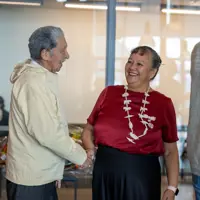
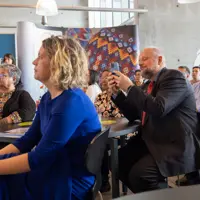
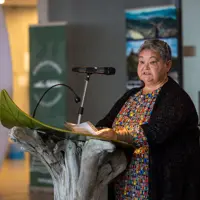
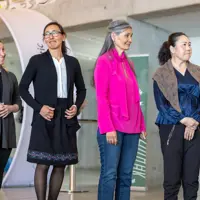
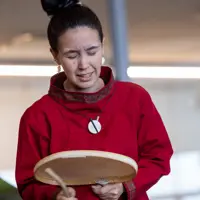
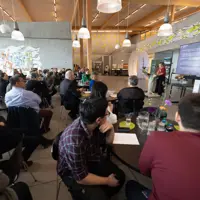
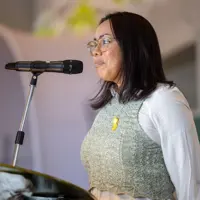
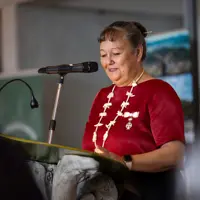

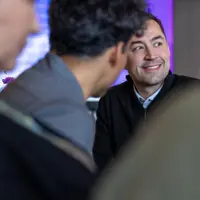
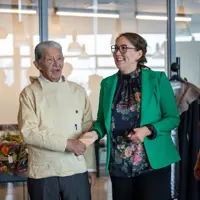
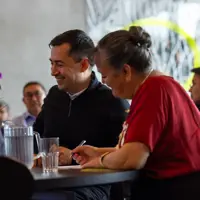
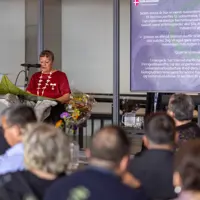
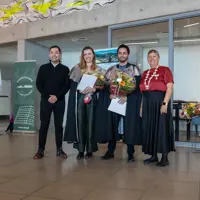
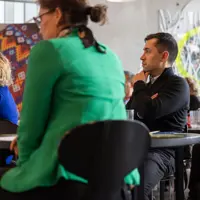
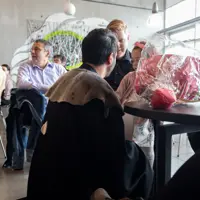
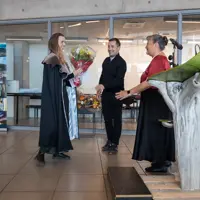
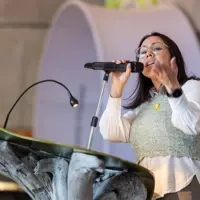
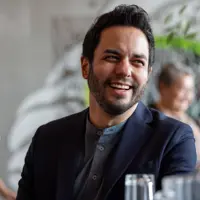
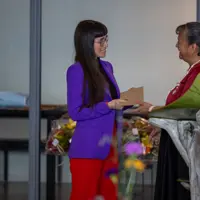
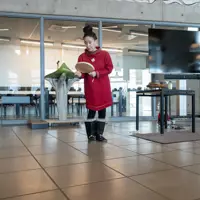
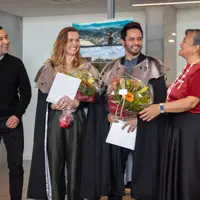
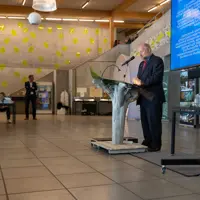
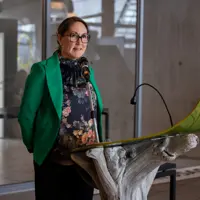
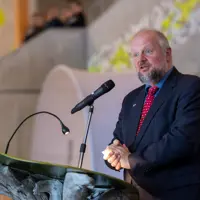
 FACEBOOK
FACEBOOK LINKEDIN
LINKEDIN Copy link
Copy link
